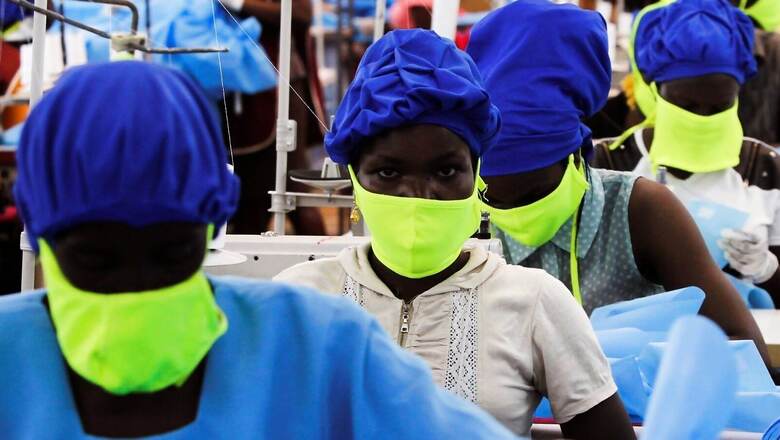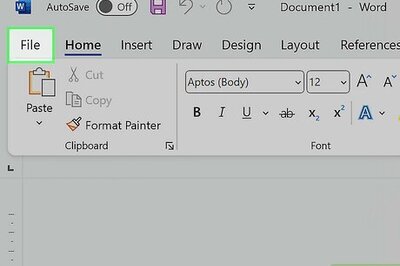
views
As one western nation after the other closed its borders to African countries after the emergence of a concerning new variant of Covid-19, dubbed Omicron by the WHO, South Africa said it was being “punished” for its advanced ability to detect new mutations early.
Southern African countries protested vehemently Saturday as more of the world’s wealthiest countries barred them from travelling, reigniting a debate over border closures that dates back to the early days of the coronavirus pandemic and exacerbating the problems faced by under-vaccinated countries. The cascade of travel bans sparked a wave of resentment among people in poorer African nations, who say they are facing the consequences of rushed response from Western nations, which had failed to deliver vaccines and resources to the region.
The variant was first detected in Botswana, put governments on edge after South Africa announced a surge of cases this week, plunging countries into the most uncertain moment of the pandemic since the highly contagious delta variant took hold this past spring. However, both of these countries have low vaccination rates, and they have documented the difficulty in obtaining doses, even accusing wealthy nations of hoarding vaccines.
As the world tips over its worry at the fag end of the year which has seen millions of deaths due to the Delta variant, here is a deeper look into how vaccine inequality may have played a big role into the emergence of this new variant.
How Does Low Vaccination Encourage Newer Variants?
The virus, since the start of the pandemic, has been evolving to a scary degree and is becoming more lethal than its original form. In such a scenario, experts say that unvaccinated people help more mutations occur.
But how does this happen? One of the key characteristics of the coronavirus is the spike protein that allows it to latch onto a host cell, penetrate it, and cause an infection.
That spike is what vaccines target to block the virus.
In the unvaccinated, however, the virus gets in, hijacks the cell, and turns it into a factory. It then makes thousands of copies of itself. If there’s a copying mistake or error, scientists call that a mutation.
Occasionally, a mutation can help the virus get into the body’s cells more easily. When mutations accumulate over time, new variants of a virus strain emerge.
African Nations Have Long Had Low Vaccination Coverage, and the West’s Role in It
Until now, slightly more than a quarter of African health workers have been fully immunised against Covid-19. That is also roughly the coverage of first doses in South Africa’s entire population.
While the developed world struck advance deals with vaccine manufacturers to secure billions of doses even before the vaccines were approved, poorer countries have relied primarily on insufficient and erratic supplies from the World Health Organization’s and other international agencies’ Covax facility.
In a recent analysis released by African countries before the G20 summit occurred, many nations from the continent flagged the fact that G20 countries had received 15 times more Covid-19 vaccine doses per capita than countries in sub-Saharan Africa. The analysis, conducted by science analytics company Airfinity, exposed the severity of vaccine inequity between high-income and low-income countries, especially in Africa.
It found that doses delivered to G20 countries per capita are:
-15 times higher than doses delivered per capita to sub-Saharan African countries;
-15 times higher than doses delivered per capita to low-income countries;
-3 times higher than doses delivered per capita in all other countries combined.
“Wealthy countries with more supplies than they need have generously pledged to donate these doses to low- and middle-income countries via COVAX but these promised doses are moving too slowly. Of the 1.3 billion additional doses countries have pledged to donate, only 356 million doses have been provided to COVAX,” UNICEF Africa said.
According to data from the Our World In Data website, only about 11% of the continent’s population has received at least one dose of the vaccine, and only 7.2% is fully vaccinated.
Do Travel Restrictions Even Help?
“Told you so,” Francois Venter, a researcher at University of the Witwatersrand in Johannesburg told the New York Times, referring to warnings from African researchers that delaying vaccinations there risked the emergence of new variants. “It feels like these rich countries have learned absolutely nothing in terms of support,” he says.
According to some health officials, the travel bans may buy them some time to figure out how to deal with the new variant. However, just as border closures a year ago did little to halt the spread of an earlier coronavirus variant from Britain, scientists said the latest travel bans were likely too late.
“Travel bans might buy countries more time to speed up Covid-19 vaccination and introduce other measures, like masking and social distancing, but they are highly unlikely to prevent the entry of new variants,” says Mark Woolhouse, professor of infectious diseases at the University of Edinburgh.
Johns Hopkins University infectious disease specialist Dr Amesh Adalja also says the travel restrictions only give the public a false sense of security and should stop being the “knee-jerk” reaction by public officials. Adalja noted imposing restrictions makes politicians “look as if they’re doing something” but doesn’t make sense when countries now have countermeasures such as rapid tests and vaccines.
Meanwhile, Sweden’s chief epidemiologist, Anders Tegnell told a local news agency said he does not believe that a travel ban would have any major effect, other than for countries with direct flights to the affected areas. “It is basically impossible to keep track of all travel flows,” Tegnell told the Expressen newspaper.
What the World Can Do to Help Africa
Increase vaccine delivery to the developing nations, economic aid and removing a patents ban on Covid-related information are among the measures the world can take to help in this situation.
South Africa and India have long called for the World Trade Organization (WTO) to suspend intellectual property (IP) rights related to COVID-19 to ensure that not only the wealthiest countries will be able to access and afford the vaccines, medicines, and other new technologies needed to control the pandemic. The pharmaceutical industry and many high-income countries are vehemently opposed to the move, which they claim will stifle innovation at a time when it is most needed. According to reports, India will lead demands at a WTO meeting next week for an intellectual property rights waiver for Covid-19 vaccines and supplies.
Meanwhile, the WHO has also called for a stop to the “scandal” of booster doses. “It makes no sense to give boosters to healthy adults or to vaccinate kids, when health workers, older people and other high risk groups around the world are still waiting for their first dose,” WHO chief Tedros Adhanom Ghebreyesus has reiterated throughout the course of the pandemic.
With inputs from the New York Times, Reuters.
Read all the Latest News here














Comments
0 comment